
Lewis Allan Reed was an American musician and songwriter. He was the guitarist, singer, and principal songwriter for the rock band The Velvet Underground and had a solo career that spanned five decades. Although not commercially successful during its existence, the Velvet Underground came to be regarded as one of the most influential bands in the history of underground and alternative rock music. Reed's distinctive deadpan voice, poetic and transgressive lyrics, and experimental guitar playing were trademarks throughout his long career.
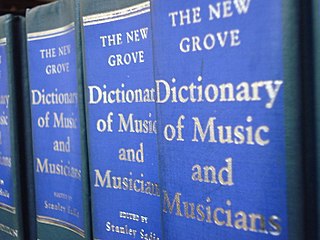
The New Grove Dictionary of Music and Musicians is an encyclopedic dictionary of music and musicians. Along with the German-language Die Musik in Geschichte und Gegenwart, it is one of the largest reference works on the history and theory of music. Earlier editions were published under the titles A Dictionary of Music and Musicians, and Grove's Dictionary of Music and Musicians; the work has gone through several editions since the 19th century and is widely used. In recent years it has been made available as an electronic resource called Grove Music Online, which is now an important part of Oxford Music Online.

Harold Victor Bauer was an English-born pianist of Jewish heritage who began his musical career as a violinist.
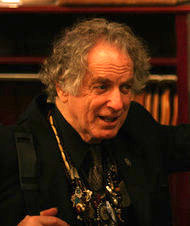
David Werner Amram III is an American composer, arranger, and conductor of orchestral, chamber, and choral works, many with jazz flavorings. He plays piano, French horn, Spanish guitar, and pennywhistle, and sings.

Guitar World is a monthly music magazine for guitarists – and fans of guitar-based music and trends – that has been published since July 1980. Guitar World, the best-selling guitar magazine in the United States, contains original artist interviews and profiles, plus lessons/columns, gear reviews, news and exclusive tablature of three songs per issue. The magazine is published 13 times per year by Future plc. Damian Fanelli has been Guitar World's Editor-in-Chief since June 2018.

Walter Dewey Redman was an American saxophonist who performed free jazz as a bandleader and with Ornette Coleman and Keith Jarrett.
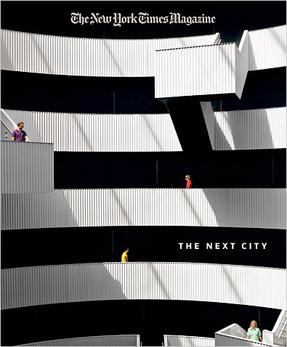
The New York Times Magazine is an American Sunday magazine included with the Sunday edition of The New York Times. It features articles longer than those typically in the newspaper and has attracted many notable contributors. The magazine is noted for its photography, especially relating to fashion and style.

Relix, originally and occasionally later Dead Relix, is a magazine that focuses on live and improvisational music. The magazine was launched in 1974 as a handmade newsletter devoted to connecting people who recorded Grateful Dead concerts. It rapidly expanded into a music magazine covering a wide number of artists. It is the second-longest continuously published music magazine in the United States after Rolling Stone. The magazine is published eight times a year and as of 2009, had a circulation of 102,000. Peter Shapiro currently serves as the magazine's publisher and Dean Budnick and Mike Greenhaus currently serve as Editor-in-Chief.
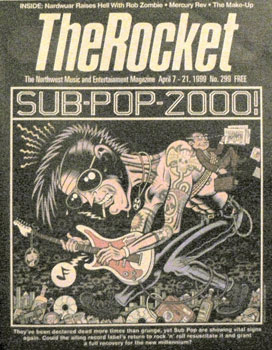
The Rocket was a free biweekly music magazine serving the Pacific Northwest region of the United States, published from 1979 to 2000. The magazine's chief purpose was to document local music. This focus distinguished it from other area weeklies such as the Seattle Weekly and the Willamette Week, which reported more on local news and politics. Originally solely a Seattle-based magazine, a Portland, Oregon edition was introduced in 1991. In general, the two editions contained the same content, with some slight variations although occasionally they ran different cover stories.
Go-Set was the first Australian pop music newspaper, published weekly from 2 February 1966 to 24 August 1974, and was founded in Melbourne by Phillip Frazer, Peter Raphael and Tony Schauble. Widely described as a pop music "bible", it became an influential publication, introduced the first national pop record charts and featured many notable contributors including fashion designer Prue Acton, journalist Lily Brett, rock writer / band manager Vince Lovegrove, music commentator Ian "Molly" Meldrum, rock writer / music historian Ed Nimmervoll and radio DJ Stan Rofe. It spawned the original Australian edition of Rolling Stone magazine in late 1972.

ZigZag was a British rock music magazine. It was started by Pete Frame and the first edition was published on 16 April 1969. The magazine was noted for its interviews, articles, innovative "rock family trees" by Frame, and support for American songwriters such as Michael Nesmith, Mickey Newbury, Gene Clark, etc. It lasted in various forms through 1986.
David Adam Cairns is a British journalist, non-fiction writer and musician. He is a leading authority on the life of Berlioz.
Jove Books, formerly known as Pyramid Books, is an American paperback and eBook publishing imprint, founded as an independent paperback house in 1949 by Almat Magazine Publishers. The company was sold to the Walter Reade Organization in the late 1960s. It was acquired in 1974 by Harcourt Brace which renamed it to Jove in 1977 and continued the line as an imprint. In 1979, they sold it to The Putnam Berkley Group, which is now part of the Penguin Group.

Louis J. Stathis was an American author, critic and editor, mainly in the areas of fantasy and science fiction. During the last four years of his life he was an editor for DC Comics' Vertigo line, working on such titles as Preacher, Doom Patrol, Industrial Gothic, Peter Kuper's The System, and Dhampire.
The Composer's Voice Concert Series is a concert series in New York City which presents contemporary chamber music. The series is produced by Vox Novus and was founded in 2001 by the composer Robert Voisey. Currently directed by Voisey, Composer's Voice holds concerts at The Firehouse Space on the third Thursday of every month. John de Clef Pineiro, in New Music Connoisseur, wrote, "[Vox Novus offers] the presentation of serious works by established and emerging composers. Those voices should be heard, and they can even be reheard on the Vox Novus website that generously offers complete audio recordings and even full scores of works presented by Vox Novus at its concerts."
Rolling Stone Australia is the Australian edition of the United States' Rolling Stone magazine devoted to music, politics, and popular culture, published monthly. The Australian version of Rolling Stone was initially published in 1970 as a supplement in Revolution magazine published by Monash University student Phillip Frazer. It was launched as a fully fledged magazine in 1972 by Frazer and was the longest-surviving international edition of Rolling Stone until its last issue appeared in January 2018.
Musicworks is a Canadian avant-garde music magazine, launched in January 1978 by Andrew Timar (editor-in-chief) and John Oswald.

Will Hermes is an American author, broadcaster, journalist and critic who has written extensively about popular music. He is a longtime contributor to Rolling Stone and to National Public Radio's All Things Considered. His work has also appeared in Pitchfork, Spin, The New York Times, The Village Voice, The Believer, GQ, Salon, Entertainment Weekly, Details, City Pages, The Windy City Times, and Option. He is the author of Love Goes To Buildings On Fire: Five Years in New York That Changed Music Forever (2011), a history of the New York City music scene in the 1970s; and Lou Reed: The King of New York, a biography.
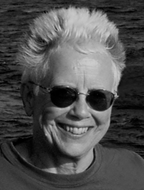
Helen Louise Thorington was an American radio artist, composer, performer, net artist and writer. She was also the founder of New Radio and Performing Arts (1981), a nonprofit organization based in New York City; the founder and executive producer of New American Radio (1987–1998); and the founder and co-director of Turbulence.org (1996–2016).

Robert Grove Hughes (1933–2022) was an American composer, conductor, bassoonist and music scholar based in the San Francisco Bay Area. He was known for his wide-ranging artistic interests—extending to poetry, performance art and social commentary—and advocacy of contemporary, often experimental music. San Francisco Chronicle critic Joshua Kosman described Hughes as a visionary and "musical Zelig" who "played a key role in a vast range of ambitious and influential musical projects." In the 1960s, Hughes co-founded the long-running Cabrillo Festival of Contemporary Music and co-founded and led the award-winning Oakland Symphony Youth Orchestra. In subsequent decades he co-founded and led the Arch Ensemble for Experimental Music with baritone vocalist Thomas Buckner and co-directed the performance group MA FISH CO with his wife, artist Margaret Fisher.














